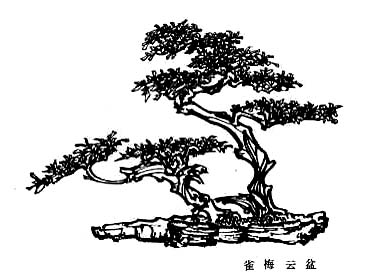詩
經
Shi Jing 
 – Le Canon des Poèmes
– Le Canon des Poèmes
Le plus ancien recueil connu de poésie chinoise, plus de trois cents chansons, odes et hymnes. Tr. Legge (en) et Granet (fr, incomplète).
Shijing III. 3. (264)
| 人 有 民 人 女 覆 奪 之 |
人 有 土 田 女 反 有 之 |
罪 罟 不 收 靡 有 夷 瘳 |
蟊 賊 蟊 疾 靡 有 夷 屆 |
邦 靡 有 定 士 民 其 瘵 |
孔 填 不 寧 降 此 大 厲 |
瞻 卬 昊 天 則 我 不 惠 |
瞻 卬 |
||
| 鞫 人 忮 忒 譖 始 竟 背 |
匪 教 匪 誨 時 維 婦 寺 |
亂 匪 降 自 天 生 自 婦 人 |
婦 有 長 舌 維 厲 之 階 |
懿 厥 哲 婦 為 梟 為 鴟 |
哲 夫 成 城 哲 婦 傾 城 |
彼 宜 有 罪 女 覆 說 之 |
此 宜 無 罪 女 反 收 之 |
瞻 卬 |
||
| 天 之 降 罔 維 其 優 儀 |
人 之 云 亡 邦 國 殄 瘁 |
不 弔 不 祥 威 儀 不 類 |
舍 爾 介 狄 維 予 胥 忌 |
天 何 以 刺 何 神 不 富 |
婦 無 公 事 休 其 蠶 織 |
如 賈 三 倍 君 子 是 識 |
豈 曰 不 極 伊 胡 為 慝 |
瞻 卬 |
||
| 無 忝 皇 祖 式 救 爾 後 |
藐 藐 昊 天 無 不 克 鞏 |
不 自 我 先 不 自 我 後 |
心 之 憂 矣 寧 自 今 矣 |
觱 沸 檻 泉 維 其 深 矣 |
人 之 云 亡 心 之 悲 矣 |
天 之 降 罔 維 其 幾 矣 |
人 之 云 亡 心 之 憂 矣 |
瞻 卬 |
||
I look up to great Heaven,
But it shows us no kindness.
Very long have we been disquieted,
And these great calamities are sent down [upon us].
There is nothing settled in the country ;
Officers and people are in distress.
Through the insects from without and from within,
There is no peace or limit [to our misery].
The net of crime is not taken up,
And there is no peace nor cure [for our state].
Men had their ground and fields,
But you have them [now].
Men had their people and followers,
But you have violently taken them from them.
Here is one who ought to be held guiltless,
But you snare him [in the net of crime].
There is one who ought to be held guilty,
But you let him escape [from it].
A wise man builds up the wall [of a city],
But a wise woman overthrows it.
Admirable may be the wise woman,
But she is [no batter than] an owl.
A woman with a long tongue,
Is [like] a stepping-stone to disorder.
[Disorder] does not come down from heaven ; –
It is produced by the woman.
Those from whom come no lessons, no instruction,
Are women and eunuchs.
They beat men down, hurtful, deceitful.
Their slanders in the beginning may be falsified in the end,
But they do not say [that their words were] very wrong ; –
[They say], ' What evil was there in them ?
As if in the three times cent per cent of traffic,
A superior man should have any knowledge of it ;
So a woman who has nothing to do with public affairs,
Leaves her silk-worms and weaving.
Why is it that Heaven is [thus] reproving [you] ?
Why is it that the Spirits are not blessing [you] ?
You neglect your great barbarian [foes],
And regard me with hatred.
You are reagrdless of the evil omens [that abound],
And your demeanour is all-unseemly ;
[Good] men are going away,
And the country is sure to go to ruin.
Heaven is letting down its net,
And many [are the calamities in it].
[Good] men are going away,
And my heart is sorrowful.
Heaven is letting down its net,
And soon [will all be caught in it ].
Good men are going away.
And my heart is sad.
Right from the spring comes the water bubbling,
Revealing its depth.
The sorrow of my heart, –
Is it [only] of to-day ?
Why were these things not before me ?
Or why were they not after me ?
But myteriously Great Heaven,
Is able to strengthen anything ;
Do not disgrace your great ancestors,
And it will save your posterity.
Legge 264

Le Canon des Poèmes – Shi Jing III. 3. (264) – Chinois on/off – Français/English
Alias Shijing, Shi Jing, Book of Odes, Book of Songs, Classic of Odes, Classic of
Poetry, Livre des Odes, Canon des Poèmes.
Le Canon des Poèmes, Les Entretiens, La Grande Étude, Le Juste Milieu, Les Trois Caractères, Le Livre des Mutations, De la Voie et la Vertu, 300 poèmes Tang, L'Art de la guerre, Trente-six stratagèmes
Bienvenue, aide, notes, introduction, table.
Index – Contact – Haut de page
